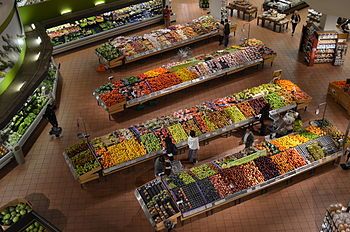Portal:Business
The Business and Economics Portal Business is the practice of making one's living or making money by producing or buying and selling products (such as goods and services). It is also "any activity or enterprise entered into for profit." A business entity is not necessarily separate from the owner and the creditors can hold the owner liable for debts the business has acquired. The taxation system for businesses is different from that of the corporates. A business structure does not allow for corporate tax rates. The proprietor is personally taxed on all income from the business. A distinction is made in law and public offices between the term business and a company such as a corporation or cooperative. Colloquially, the terms are used interchangeably. (Full article...) Economics (/ˌɛkəˈnɒmɪks, ˌiːkə-/) is a social science that studies the production, distribution, and consumption of goods and services. Economics focuses on the behaviour and interactions of economic agents and how economies work. Microeconomics analyses what is viewed as basic elements within economies, including individual agents and markets, their interactions, and the outcomes of interactions. Individual agents may include, for example, households, firms, buyers, and sellers. Macroeconomics analyses economies as systems where production, distribution, consumption, savings, and investment expenditure interact, and factors affecting it: factors of production, such as labour, capital, land, and enterprise, inflation, economic growth, and public policies that have impact on these elements. It also seeks to analyse and describe the global economy. (Full article...) Selected article
John Davison Rockefeller, Sr. (July 8, 1839–May 23, 1937) was an American industrialist and philanthropist who played a pivotal role in the establishment of the oil industry, and defined the structure of modern philanthropy. In 1870, Rockefeller helped found the Standard Oil company. Over a forty-year period, Rockefeller built Standard Oil into the largest and most profitable company in the world, and became the world's richest man.
His business career was controversial. He was bitterly attacked by muckraking journalists; his company was convicted in the Federal Court of monopolistic practices and broken up in 1911. He gave up active management of Standard Oil in the late 1890s, while keeping a large fraction of the shares. He spent the last forty years of his life focused on philanthropic pursuits, primarily related to education and public health. He donated most of his wealth using multiple foundations run by experts. He was a devout Northern Baptist and supported many church-based institutions throughout his life. Rockefeller may ultimately be remembered simply for the raw size of his wealth. In 1902, an audit showed Rockefeller was worth about $200 million, compared to the total national wealth that year of $101 billion. His wealth grew significantly after as the demand for gasoline soared, eventually reaching about $900 million, including significant interests in banking, shipping, mining, railroads, and other industries. By the time of his death in 1937, Rockefeller's remaining fortune, largely tied up in permanent family trusts, was estimated at $1.4 billion. Rockefeller's net worth over the last decades of his life would easily place him among the list of wealthiest persons in history. As a percentage of the United States economy, no other American fortune—including Bill Gates or Sam Walton—would even come close. Selected image
Selected economyThe economy of Nigeria is a middle-income, mixed economy and emerging market with expanding manufacturing, financial, service, communications, technology, and entertainment sectors. It is ranked as the 53rd-largest economy in the world in terms of nominal GDP, the fourth largest in Africa and the 27th-largest in terms of purchasing power parity. The country's re-emergent manufacturing sector became the largest on the continent in 2013, and it produces a large proportion of goods and services for the region of West Africa. Nigeria's debt-to-GDP ratio was 36.63% in 2021 according to the IMF. (Full article...) Selected quote"In a plant where required numbers actually dictate production, I like to point out that the slower but consistent tortoise causes less waste and is much more desirable than the speedy hare who races ahead and then stops occasionally to doze. The Toyota production system can be realized only when all the workers become tortoises. High-performance machines were in demand for a long time before the term "high performance" was thoroughly examined. When we say high performance, we may mean high-precision finishing, low energy consumption, or even high-precision finishing, low energy consumption, or even trouble-free machines. Each can be correct. However, a frequent mistake is to regard high-productivity and high-speed machines as being the same. If we can raise the speed without lowering the operable rate or shortening the life of the equipment, if a higher speed will not change the manpower requirements or produce more products than we can sell - then we can say high speed means high productivity. Speed is meaningless without continuity. Just remember the tortoise and the hare. Moreover, we cannot fail to notice that machines not designed for endurance at high speeds will have shortened lifespans if we speed them up."
TopicsRelated WikiProjectsDid you know (auto-generated) -
On this day in business history
General imagesThe following are images from various business-related articles on Wikipedia.
More did you know
Business news
SubcategoriesRelated portals
Things you can doUrgent and important articles are bold
WikimediaThe following Wikimedia Foundation sister projects provide more on this subject:
SourcesDiscover Wikipedia using portals |








































